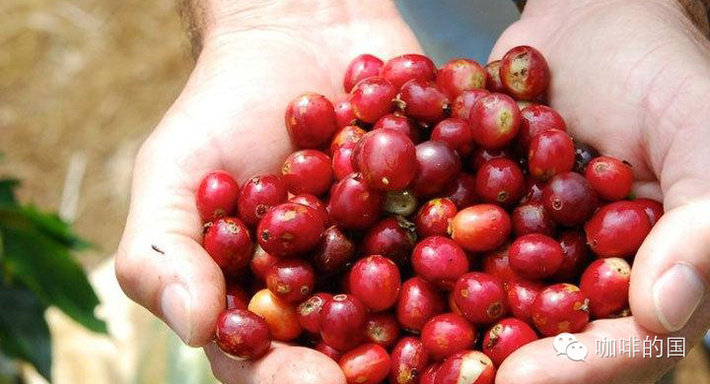Costa Rican Coffee House-Diamond Hill Coffee House Costa Rican Coffee House

Costa Rican coffee cultivation was introduced by Cuba in 1779 and exported for the first time in 1820. There are about 32000 coffee farmers, with an average planting area of less than one hectare (10000 hectares) per farmer. Costa Rica has a population of 41 billion (2006), with a coffee planting area of 82500 hectares and an annual production of 1.7 million bags (60kgs per bag). The annual domestic consumption is 380000 bags, with an average annual national consumption of 5.5kgs, which is higher than that of Japan (consumption 4kgs). At present, Taiwanese are only slightly higher than 1kg. Costa Rica is the country where coffee was first introduced into Central America. It has a long history and has a complete coffee organization from production to marketing system. Because it is located in the Central American Gorge, there are many volcanoes, it has the natural advantages of sunshine and land, and the climate is reconciled by Pacific and Atlantic currents and sea breezes at the same time, the coffee produced has the characteristics of local micro-climate and soil conditions, in terms of quality and quantity, Costa Rican coffee has always been recognized by the world, and has been rated as one of the world-class high-quality coffee. Costa Rican coffee has been cultivated for 200 years. It was first planted on the slopes of the Poas and Barva volcanoes, today known as the Central Valley (Central Valley). The seven main coffee producing areas are from northwest to southeast, divided by the inland central plateau. Costa Rican volcanic terrain with fertile volcanic ash, mild and suitable temperature, and stable and abundant rainfall is one of the reasons why coffee has become one of the main agricultural products in Costa Rica. The seven major producing areas are: Tarrzu, Tres Rios, Orosi, Central Valley, West Valley, Turrialba and Brunca.
Costa Rica has a long history of cultivating coffee, but in the past 10 years, the new "dry" treatment method has become popular, collectively known as "honey treatment", which uses the scraper to adjust the scraping degree of the pulp. The output shows a "honey feeling" from light to dark (white, yellow-red-white, yellow-red-black) with a thick sense of acidity and complex aroma. Each has its own depth and advantages. Diamond Hill Manor (Finca Montanas del Diamante) is located in the Tarrazu producing area, Dota Valley. Coffee is planted at 1750 to 1850 meters above sea level, with a variety of Red Kaduai (Red Catuai). The owner of the estate, the Gutierrez family, owns 50 hectares of coffee.
Costa Rican coffee has always been regarded as the perfect type of classic flavor, balanced, dry, mild is his tone, this batch of Diamond Hill Manor (Finca Montanas del Diamante) from the famous Tarrazu boutique bean producing area, famous for excellent natural geographical conditions and excellent regional planting management techniques, almost perfect classical flavor, lively citrus flavor in texture The aromas of black grapes and melons are smooth on the palate with drupe / micro-flower aromas, while the finish has a significant coffee flower aroma. Its flavor characteristics are clear, balanced, complex and changeable, soft orange notes, toast, dry taste, sweet caramel, sweet melons and a good finish.
Important Notice :
前街咖啡 FrontStreet Coffee has moved to new addredd:
FrontStreet Coffee Address: 315,Donghua East Road,GuangZhou
Tel:020 38364473
- Prev

How to choose coffee beans choose fresh coffee beans Columbia Santa Rita washing coffee beans
The history of coffee cultivation in Colombia can be traced back to the Spanish colonial era in the 16th century, and there are many theories about the history of coffee in Colombia: one: it is said to come from the island of Haiti in the Caribbean and from El Salvador in Central America. Second: in 1808, a priest introduced coffee beans to Colombia for the first time from the French Antilles via Venezuela. One of them
- Next

Arabica Variety Rose Summer Hope Manor in Cauca Valley of Colombia Sun treatment of Geisha / Rose Summer
Ten years ago, most coffee farms in Colombia went all out to sprint production, and when the government advocated the cultivation of high-yield beans with strong disease resistance and discouraged good flavor but low yield, it was hoped that the manor would resolutely embark on the long road of fine coffee. The opportunity that the manor was expected to see at that time was Geisha (also known as a geisha). The Emerald Manor of Panama has rediscovered the rose summer in the garden.
Related
- Does Rose Summer choose Blue, Green or Red? Detailed explanation of Rose Summer Coffee plots and Classification in Panamanian Jade Manor
- What is the difference between the origin, producing area, processing plant, cooperative and manor of coffee beans?
- How fine does the espresso powder fit? how to grind the espresso?
- Sca coffee roasting degree color card coffee roasting degree 8 roasting color values what do you mean?
- The practice of lattes: how to make lattes at home
- Introduction to Indonesian Fine Coffee beans-- Java Coffee producing area of Indonesian Arabica Coffee
- How much will the flavor of light and medium roasted rose summer be expressed? What baking level is rose summer suitable for?
- Introduction to the characteristics of washing, sun-drying or wet-planing coffee commonly used in Mantenin, Indonesia
- Price characteristics of Arabica Coffee Bean Starbucks introduction to Manning Coffee Bean Taste producing area Variety Manor
- What is the authentic Yega flavor? What are the flavor characteristics of the really excellent Yejasuffi coffee beans?

